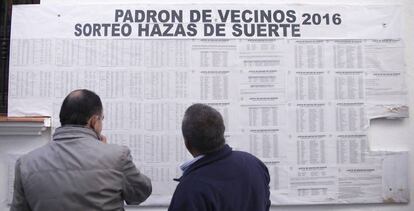The ‘lucky lands’ of Vejer: Spain’s other Christmas lottery
Dating back 700 years, town's four-yearly draw is a unique example of income distribution

Vejer de la Frontera, a small agricultural town a couple of kilometers inland from the surfer’s paradise of Tarifa, on Spain’s Atlantic Cadiz coastline, buzzes with excitement in the run up to December 22. This is the day Spain holds the draw to its El Gordo Christmas lottery, but many of Vejer’s 12,897 residents are more likely to be hoping to win of plot of land in a draw held every leap year dating back more than seven centuries.

In the weeks ahead of the lottery, which only takes place every four years, there is little else being talked about in the cafes and streets of this picturesque whitewashed town.
On Thursday morning, while children from Madrid’s San Ildefonso school sing out the numbers for the national lottery in in the capital’s nearby Teatro Real, as they have done since 1771, girls from Vejer, in typical regional costume, announce Vejer’s winners in the local theater.
But instead of mountains of cash, the winners in Vejer will be entitled, until the next leap year in 2020, to earn money from renting out one or two of the 232 plots of land that the town raffles off.
The words ‘lucky lands’ will usually spark good-natured debate in the town’s bars
“It’s the most egalitarian way to share the town’s common assets. It’s unique. I still haven’t been able to find an example of anything similar,” says Juan Jesús Cantillo, a local historian.
The tradition of the ‘lucky lands’ began in 1288 amid the Reconquista—the war between Spanish Christians and Moorish Muslims for control of the Iberian Peninsula.
“In such a vulnerable region so close to the southern frontier [with Moorish-controlled territory], King Sancho IV decided to encourage people to settle the town. Besides giving settlers tax breaks, he also gave them a series of lots of farmland, so they wouldn’t have to answer to a lord or landowner,” explains Cantillo.
“It’s believed the King made this deal with other towns in the south, from Granada to Cadiz. However, noblemen took the land in other areas,” he adds.
Vejer also lost these plots of land to the nobility after King Ferdinand IV donated a house to a duke.
“The transfer of the title infuriated the town, and it was a local man, Juan Relinque, who decided to fight it,” said Cantillo.
Relinque, now a local hero, sued the duke for the land rights, but died in the middle of the legal proceedings. The other townsfolk however, “imbued with the spirit of freedom and justice,” carried on with the case, explains Cantillo.
It’s the most egalitarian way to share the town’s common assets Juan Jesús Cantillo, local historian
On February 8, 1566 the courts ruled against the duke and on the side of the residents of Vejer.
“At that time, the town had grown so much that there were more residents than plots available, so they decided to create a lottery to give the lands out,” says Cantillo.
This year, the town is celebrating the 450th anniversary of the first raffle. In today’s draw, 1747 households have registered, hoping to win one of 232 plots of land.
Winners of the lottery typically rent out the plots to local farmers. Depending on the size, they can earn between €750 and €1,300 per year. Local banks have even caught on and offer deals to give the winners all of the money upfront, in exchange for commission fees.
For the last two years Cantillo has been lobbying UNESCO to consider Vejer’s ‘lucky lands’ raffle as an intangible cultural heritage and for the Spanish government to name the lottery as an asset of cultural interest. He said that the official statuses could help “protect a tradition” that draws on Vejer’s unique culture, society, economics and identity.
Any morning in the days leading up to the draw, the words ‘lucky lands’ will usually spark good natured debate in the town’s bars.
“I’m not signed up because I got married, and my family changed but they didn’t register it. But four years ago my dad won and he opened a savings account and saved all the money for my daughter,” explains one man.
Sherry glass in hand, a neighbor replies “Do you remember Antonio, the guy who won twice? That was lucky!”
Cantillo, used to these lively exchanges, smiles. “Do you see what I mean? People talk about the lands as ‘ours.’ Here we know how to distinguish between what’s public, what’s private and what’s communal.”
English version by Alyssa McMurtry.
Tu suscripción se está usando en otro dispositivo
¿Quieres añadir otro usuario a tu suscripción?
Si continúas leyendo en este dispositivo, no se podrá leer en el otro.
FlechaTu suscripción se está usando en otro dispositivo y solo puedes acceder a EL PAÍS desde un dispositivo a la vez.
Si quieres compartir tu cuenta, cambia tu suscripción a la modalidad Premium, así podrás añadir otro usuario. Cada uno accederá con su propia cuenta de email, lo que os permitirá personalizar vuestra experiencia en EL PAÍS.
¿Tienes una suscripción de empresa? Accede aquí para contratar más cuentas.
En el caso de no saber quién está usando tu cuenta, te recomendamos cambiar tu contraseña aquí.
Si decides continuar compartiendo tu cuenta, este mensaje se mostrará en tu dispositivo y en el de la otra persona que está usando tu cuenta de forma indefinida, afectando a tu experiencia de lectura. Puedes consultar aquí los términos y condiciones de la suscripción digital.








































